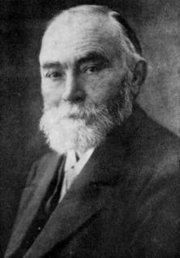Gottlob Frege
|
|
Friedrich Ludwig Gottlob Frege (November 8, 1848 – July 26, 1925) was a German mathematician, logician, and philosopher who is regarded as a founder of both modern mathematical logic and analytic philosophy.
| Contents |
Frege's life
Frege was born in Wismar. He started studying at the University of Jena in 1869 and moved to Göttingen after two years, where he received his Ph.D. in 1873. After returning to Jena two years later, he became lecturer of mathematics. In 1879, he was made associate professor and in 1896 became professor of mathematics. He died in Bad Kleinen in 1925.
Frege's contribution
Frege is widely regarded as the greatest logician since Aristotle. His revolutionary Begriffsschrift, or Concept Script from 1879 marked the beginning of a new epoch in the history of logic by displacing the old Term Logic that had held sway virtually unchanged since Aristotle. The Begriffsschrift was ground-breaking, and made contributions that are nowadays ubiquitous in mathematics, such as the use of quantification, which solved the medieval problem of multiple generality, and a clean treatment of functions and variables.
Frege was the first to devise an axiomatization of propositional logic and of predicate logic, the latter of which was his own invention. The quantification so essential to Bertrand Russell's theory of descriptions, and to Russell and Alfred North Whitehead's Principia Mathematica, was also due to Frege. His work was largely unrecognized in his own day, and his ideas spread chiefly through those he influenced, particularly Giuseppe Peano and Russell. Ludwig Wittgenstein and Edmund Husserl were among the other philosophical notables strongly influenced by Frege.
Frege is regarded as one of the founding fathers of analytic philosophy, due to his deeply systematic contributions to the philosophy of language, most fundamentally his function-argument analysis of the proposition, his distinction between the sense and reference of a proper name (Eigenname), his distinction between concept and object, and his advancement of the context principle. He corresponded with many leading logicians and philosophers of his time, such as Max Schroeder, and Edmund Husserl.
Frege was the first major proponent of logicism -- the view that mathematics is reducible to logic. His Grundgesetze der Arithmetik was an attempt to explicitly derive the laws of arithmetic from logic. After the first volume was published (at the author's expense), Russell discovered the paradox which bears his name, and that the axioms of the Grundgesetze led to this contradiction; he wrote to Frege, who acknowledged the contradiction in an appendix to volume two of the Grundgesetze, noting what he perceived to be the faulty axiom. Frege never did manage to amend his axioms to his satisfaction, although later work by Russell and by John Von Neumann showed how to resolve the problems.
Despite this, and despite the generosity of Bertrand Russell's praise for Frege, he remained an obscure figure through his lifetime; had it not been for his influence on Ludwig Wittgenstein --of whom both major works, the Tractatus and the Philosophical Investigations, revolved around a coming to terms with Frege's ideas about logic and language-- Frege's worth as a philosopher may never have been recognised.
Leading authorities on Frege include Michael Dummett, Günther Patzig, Hans Sluga, Terence Parsons (http://admin.cdh.ucla.edu/facwebpage.php?par=91), and Vincent Riolo.
Principal works
- Begriffsschrift (Concept Script), eine der arithmetischen nachgebildete Formelsprache des reinen Denkens, Halle a. S., 1879
- Die Grundlagen der Arithmetik (The Foundations of Arithmetic): eine logisch-mathematische Untersuchung über den Begriff der Zahl, Breslau, 1884
- "Funktion und Begriff" ("Function and Concept"): Talk given in a Meeting on January 9, 1891 of the Jenaischen Gesellschaft für Medizin und Naturwissenschaft, Jena, 1891
- "Über Sinn und Bedeutung" ("On Sense and Denotation"), in Zeitschrift für Philosophie und philosophische Kritik, C (1892): 25-50
- "Über Begriff und Gegenstand" ("On Concept and Object"), in Vierteljahresschrift für wissenschaftliche Philosophie, XVI (1892): 192-205
- Grundgesetze der Arithmetik ("Basic Laws of Arithmetic"), Jena: Verlag Hermann Pohle, Band I (1893), Band II (1903)
- Was ist eine Funktion? ("What is a Function?"), in Festschrift Ludwig Boltzmann gewidmet zum sechzigsten Geburtstage, February 20 1904, S. Meyer (ed.), Leipzig, 1904, pp. 656-666
- "Der Gedanke" ("The Thought") Eine logische Untersuchung, in Beiträge zur Philosophie des Deutschen Idealismus I (1918-1919): 58-77
- "Die Verneinung" ("Negation"), in Beiträge zur Philosophie des deutschen Idealismus I (1918-1919): 143-157
- "Gedankengefüge" ("Compound Thought"), in Beiträge zur Philosophie des Deutschen Idealismus III (1923): 36-51
Frege intended these last three papers to be published in a book to be called Logical Investigations; in 1975 they were posthumously published (in English translation, at least) under this title.
A complete chronological bibliography of Frege's works (http://www.ocf.berkeley.edu/~brianwc/frege/fenglish.html) and their English translations is provided by Gottlob Frege (1848-1925) (http://www.ocf.berkeley.edu/~brianwc/frege/), which attempts to be a comprehensive resource of Fregean material available on the web.
External links
- "Gottlob Frege" in Stanford Encyclopedia of Philosophy (http://plato.stanford.edu/entries/frege/)
- "Frege's Logic" in Stanford Encyclopedia of Philosophy (http://plato.stanford.edu/entries/frege-logic/)
- "Gottlob Frege" in Internet Encyclopedia of Philosophy (http://www.utm.edu/research/iep/f/frege.htm)
- Über Heiratskreis und Großstadtbindung des Besitz- und Bildungsbürgertums: Das Beispiel Frege (http://www.volkmar-weiss.de/frege.html)da:Gottlob Frege
de:Gottlob Frege et:Gottlob Frege es:Gottlob Frege eo:Gottlob FREGE fr:Friedrich Ludwig Gottlob Frege ko:고틀로프 프레게 it:Gottlob Frege he:גוטלוב פרגה hu:Friedrich Ludwig Gottlob Frege nl:Gottlob Frege ja:ゴットロープ・フレーゲ no:Gottlob Frege pl:Gottlob Frege pt:Gottlob Frege sk:Gottlob Frege sl:Friedrich Ludwig Gottlob Frege fi:Gottlob Frege sv:Gottlob Frege tr:Gottlob Frege

